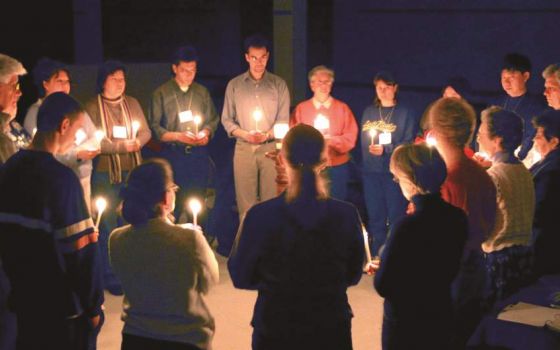
Art by Julie Lonneman
Isaiah 55 is addressed to Jews in the sixth century B.C.E. who were displaced to Babylon, who had, in various ways, accommodated the pressures, requirements and promises of Babylonian empire at the expense of their own peculiar Jewish way in the world.
While verses 6-9 sound like and are often utilized as a generic summons to repent, in fact they constitute a quite specific summons to the Jewish people of God in the ancient world to forego the seductions of the empire in order to reengage their own true identity as the Jewish people of God. The ideology of the Babylonian empire, like the ideology of every empire, was concerned with endless productivity and the demands and hopes of power and control that imagined a capacity to have life on one's own terms. Conversely, such an imperial ideology is always impatient with local tradition, here the local tradition of Judaism. Clearly the ideology of empire contradicted the claims of Jewish faith concerning trust in and obedience to the God of the covenant whose purpose is one of mercy, justice and compassion.
We may notice two powerful accents that surround these verses in Isaiah 55. Just before our verses, in verses 1-2, the poet poses the demanding question to Jews who had succumbed to Babylonian pressure: "Why do you labor for that which does not satisfy?" Why do you sign on for a system of coercion and manipulation and endless production that will never bring you well-being? Why do you commit to the mad Babylonian pursuit of power and wealth, when in the end such a pursuit will never make you safe or make you happy? And then the poet offers an alternative in the faith tradition of YHWH: free bread, free water, free milk, gifts that are beyond the gift of the empire. These verses make the contrast complete and uncompromising.
Our verses 6-9, moreover, are followed in the poem by a profound assurance that is ground for a radical change of conduct: God's word can be trusted (vv. 10-11). Unlike the word of the empire, God's word is not empty or powerless or futile, but strong enough that it will come to fruition. That word from YHWH to YHWH's people is a word of promise that God will be faithful, quite a contrast to the word of the empire that is incapable of real fidelity.
And finally, at the end of the chapter, the poet imagines a homecoming for the displaced people of God. The homecoming might in context have been geographical. But it is also psychological, liturgical and finally economic. The homecoming is a return to one's true destiny in faith after a time of having lost the way amid the empire. The ultimate promise is that God has a way for the displaced faithful; this is the God who makes "a way out of no way." God has an intention for God's people that is marked by mercy and pardon and welcome. The poet invites his listeners to come to their senses, and to notice that their destiny is grounded in divine fidelity and not in control or productivity of the empire.
When we let this lyrical text surge out of the sixth century B.C.E. into our contemporary horizon of faith, we can imagine that the poem is addressed as well to the contemporary church that often loses its way in accommodation to the world in excessive control, in pursuit of the gifts of an unbelieving world. When the poem is heard as addressed to the church, it is a summons that the church should come to its senses about its true identity and destiny that are grounded singularly in the generous fidelity of God. Such a "coming to sense" empowers the church, as God's people, to be very different in the world for the God of mercy, justice and compassion.
But given the profound crisis in our society, we do well to let this text, in its compelling contemporaneity, push out beyond the church to our larger social context. Of course U.S. society is not directly "the people of God," and no immediate Christian or Jewish claim can be imposed on our society that is constitutionally distanced from religious claims. Given that reality, it is nonetheless true that faith claims are deeply engrained in the memory and character of our society, so much so that they play well in current political discourse. As a result, we may exercise liberated faithful imagination to see how this text is heard when it is heard in our society (and in our economy) that has imperial ambitions and imperial seductions.
It takes no deep insight to see that our society has lost its way. The current economic crisis only underscores the skewing of human value in our society that has been underway for a long time. The current quality of our society, in its mad pursuit of money, power and control, is now largely alienated from rootage in faith traditions that would articulate our society as a covenantal community. It is clear that with the free market ideology, aggressive consumerism, unrestrained militarism and the reduction of value to commodity, our society is engaged in a rapid process of self-destruction. The signs of that lethal path are evident in the erosion of a societal infrastructure for which no one is willing to pay, and specifically in the absence of an adequate health care policy. In its main contours, our society has largely succumbed to the ideology of empire in which individual persons are discounted and overlooked by the great engines of control and profit.
Advertisement
It is particularly the task of the church — and its ministers — to identify the crisis by shunning euphemisms and calling things by their right names, by articulating an alternative of generous neighborliness that eventuates in justice, and by summoning the community to re-embrace deeply rooted identity and destiny. Thus, to church and to nation, the call is "to seek the Lord," which means a return to one's rootage and away from the quick promises of empire. It is a huge mandate for the church in our society, especially when so much of the faithful community itself has in fact succumbed — along with society to the passions of control and wealth. Given that pastoral mandate, I suggest we have no better script for that naming by right names and that articulation of alternative and summoning to repent than we have in Isaiah 55.
- Through the text, the church can pose the hard question to our society, and to the baptized in that society: Why do you labor for that which does not satisfy? Why do you use your energy, power, resources, and your life in ways that will not bring well-being? This question is posed broadly to all those who are mesmerized by the false offers of the imperial ideology.
- Through the text, the church can issue the urgent summons to our society, and to the baptized in that society: Seek the Lord; return to the will and purpose of God, and ponder God's way and God's plan that is not like our way and our plan. The news of the poem is that the summons is one of mercy and pardon. The repentance invited here is not especially pious or moralistic, but has to do with the reorientation of public purpose, a reallocation of public resources, a relinquishment of passions and goals of power and control that are inimical to the faith tradition.
- Through the text, the church can offer a deep promise of fidelity to our society, and to the baptized in that society. God's promise is durable and will come to fulfillment, like rain and snow that bring fruitfulness in the earth. This capacity of God to follow through and keep promises is quite in contrast to the illusions of empire that can never deliver on its promises, because its offer of wealth, power and control is inherently destructive.
- Through the text, the church can engender a departure from imperial modes of life in our society, and invite the baptized to be at the head of the procession that departs. The ones who go (and take it as their life's vocation to go) may walk boldly out of the insatiable anxiety of imperial modes of existence. The poem affirms that God's faithful people — in ancient Israel, in the contemporary church, and in present-day society — can act outside the grip of empire. But it requires an intentional departure … going out in joy and being led back in peace (55:12).
The text is a powerful and compelling instrument for telling connection between the deep summons of God and the patient work of social divestment and restoration. The mandate is urgent because there is no one except those with this text who can make that urgent appeal. The poet imagines that outside the grip of imperial pretention, society can be organized differently. That news is a divine gift, but it is also a human calling to be undertaken by those who refuse the empire, turn to the way, recover their sanity and answer back to God in fidelity. There is a great deal at stake in texts like this being faithfully rendered in the church.
Editor's note: This reflection was originally published in the March 2007 issue of Celebration. Sign up to receive daily Lenten reflections.







